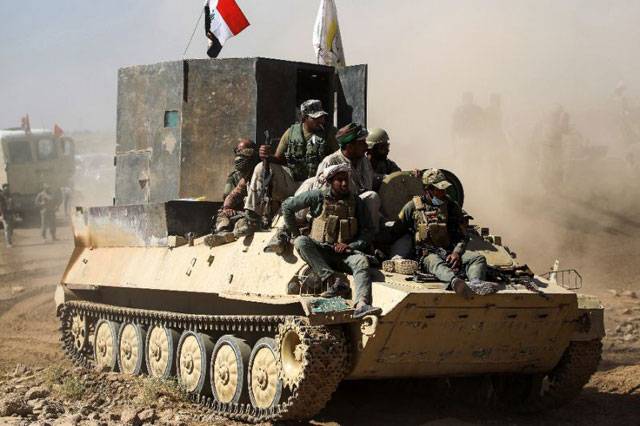BAGHDAD - Iraq on Monday rebuffed a US demand that Iranian militias leave the country, insisting that the paramilitary forces which helped it defeat the Islamic State group consist solely of Iraqi nationals.
"Nobody has the right to interfere in Iraqi affairs," the Iraqi cabinet said in a statement, quoting a source close to Prime Minister Haider al-Abadi.
"The fighters of the Hashed (al-Shaabi paramilitary units) are Iraqis who are concerned for their country and have sacrificed for its defence and for its people," it said.
On Sunday, US Secretary of State Rex Tillerson demanded that Iranian militias leave Iraq. "Certainly Iranian militias that are in Iraq, now that the fighting against (IS) is coming to a close, those militias need to go home," Tillerson said. "All foreign fighters need to go home," he said at a press conference in Riyadh.
The 60,000-strong Hashed was formed in 2014 after IS seized swathes of northern Iraq, routing government forces.
A coalition mostly made up of Iranian-backed militias, it has played a key role in Iraq's successful fightback against the militants over the past three years. It answers to Iraq's prime minister as commander-in-chief of the Iraqi armed forces, into which it has been integrated by a parliamentary vote.
Tillerson flies to Baghdad to meet Iraq PM
US Secretary of State Rex Tillerson on Monday flew in to Baghdad on a surprise visit for talks with Iraq’s Prime Minister Haider al-Abadi and President Fuad Massum.
The visit, during which Tillerson and Abadi will hold their second meeting in as many days, comes after America’s US top diplomat called on Iranian militias to leave Iraq, prompting a sharp response from the Iraqi cabinet. “Certainly Iranian militias that are in Iraq, now that the fighting against (the Islamic State group) is coming to a close, those militias need to go home,” Tillerson said Sunday at a press conference in Riyadh.
Russia's Lavrov calls for Iraq-Kurd dialogue
Russian Foreign Minister Sergei Lavrov on Monday called for dialogue between the Iraqi Kurdistan and Baghdad, warning that tensions following last month's Kurdish independence referendum should not become "another source of instability." "We understand the hopes of Kurdish people to strive and strengthen their identity... but it would be right to realise these hopes through dialogue with the Iraqi government," Lavrov said after talks with Iraqi counterpart Ibrahim al-Jaafari.
He said the issue should be addressed "with consideration of the need to avoid creating another source of instability in the region."
Iraqi Kurds on September 25 voted overwhelmingly for independence in a poll set in motion by longtime regional leader Massud Barzani and strongly opposed by Baghdad.
Central government forces last week swept into the oil-rich Kirkuk province, restoring it and Kurdish-held parts of Nineveh and Diyala provinces to Baghdad's control.
"We don't see war yet, and we hope that it won't happen between the Kurds and government troops of Iraq," Lavrov added.
He said Baghdad does not "reject" Kurds, ban their language or destroy their monuments, so "all components" are in place for them to figure out how to "live together in a unified Iraq".
"The sides should decide if they will engage in direct dialogue or if they need some sort of intermediaries," he added.






